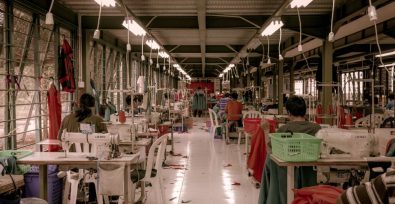Modern slavery remains an unsettling presence in our every day lives. Our garments, smartphones, and even solar panels often carry the grim mark of forced labor and human exploitation. This disturbing reality begs a question: if consumers truly understood the human suffering behind their purchases, would they make different choices?
That’s a question chief on Nasreen Sheikh’s mind.
“I ate, slept and worked my little fingers raw”
Nasreen is a survivor. She grew up in sweatshops in Kathmandu, Nepal, working for 12 – 15 hours a day, earning less than $2 for each – if she managed to complete hundreds of garments. Most of the time, she was paid nothing at all. She ate, slept, and worked in a workstation she describes as no bigger than a prison cell, sewing until her fingers bled.
Today, she can’t see clothing in chain stores in the U.S. without seeing suffering.
“I walked the aisles in disbelief – I had never experienced this level of both luxury and convenience. It was horrifying to see – but also a great revelation to recognize the exploitation and abject poverty attached to these products. Seeing in my memory the ghostly faces of children like me, scattered into the thousands of products around me, brought me to tears.”
Nasreen prefers to buy secondhand and doesn’t trust clothing which has an unclear story of origin.
A call for radical transparency
For USA Today, Nasreen Sheikh writes,
The development of policy to address modern slavery will always be impeded as long as it ignores how the issues are deeply intersected with wider structures, systems and behaviors. Focusing on issues in silos will hold us back from solutions for decades to come.
Modern slavery thrives in the shadows and darkness, the unspoken truth, the hidden parts of our global society too ugly or horrific to witness in light. But truth is the key.
We need radical supply chain transparency and nonnegotiable, meaningful engagement from all businesses and corporations. We need modern slavery legislation that imposes the duty to protect all workers in supply chains and ensures the protection of our planet. We need to hold companies liable for breaches and inaction, leaving no one behind in the pursuit of a thriving global economy.
Join the movement
We fully support Nasreen’s call for greater industry transparency and accountability. Until then, we’re also questioning the story behind the clothes we wear and buy.
Join us and take the Freedom United Fashion Pledge to commit to sustainable and ethical fashion and better industry standards.







Freedom United is interested in hearing from our community and welcomes relevant, informed comments, advice, and insights that advance the conversation around our campaigns and advocacy. We value inclusivity and respect within our community. To be approved, your comments should be civil.
We cannot continue to think of the history of slavey as being obviously wrong while at the same time ignore that it still goes on today. We as a global community need to take drastic action to put put an end to slavery immediately.
I also buy less clothes, better quality that last longer and have no care for fashion. People do not realize that the fashion industry is also a VERY BIG contributor to climate change.
How did nashreen sheikh get into slavery? Is this even allowed in islam?
Ja, totale Transparenz wäre die Lösung! Ich bin sicher, daß viele Käufe solcher Produkte aus moderner Sklavenarbeit aus Unwissenheit passieren. Sehr gern würden viele Konsumenten wie ich etwas mehr bezahlen für Produkte, bei denen wir sicher sein können, daß sie unter fairen Bedingungen produziert wurden. Ich mißtraue natürlich allzu billigen Produkten, aber – wie wir wissen – hohe Produktpreise sind noch keine Garantie für faire Entlohnung der Arbeiterinnen. Echte Transparenz wäre nötig!
This is important but may not be easy to resolve. If corporations require greater transparency, my concern is that they will shut down plant X and open plant Y elsewhere, with new workers at the same low pay/no pay rate. Do we have a right to impose our standards on other countries?